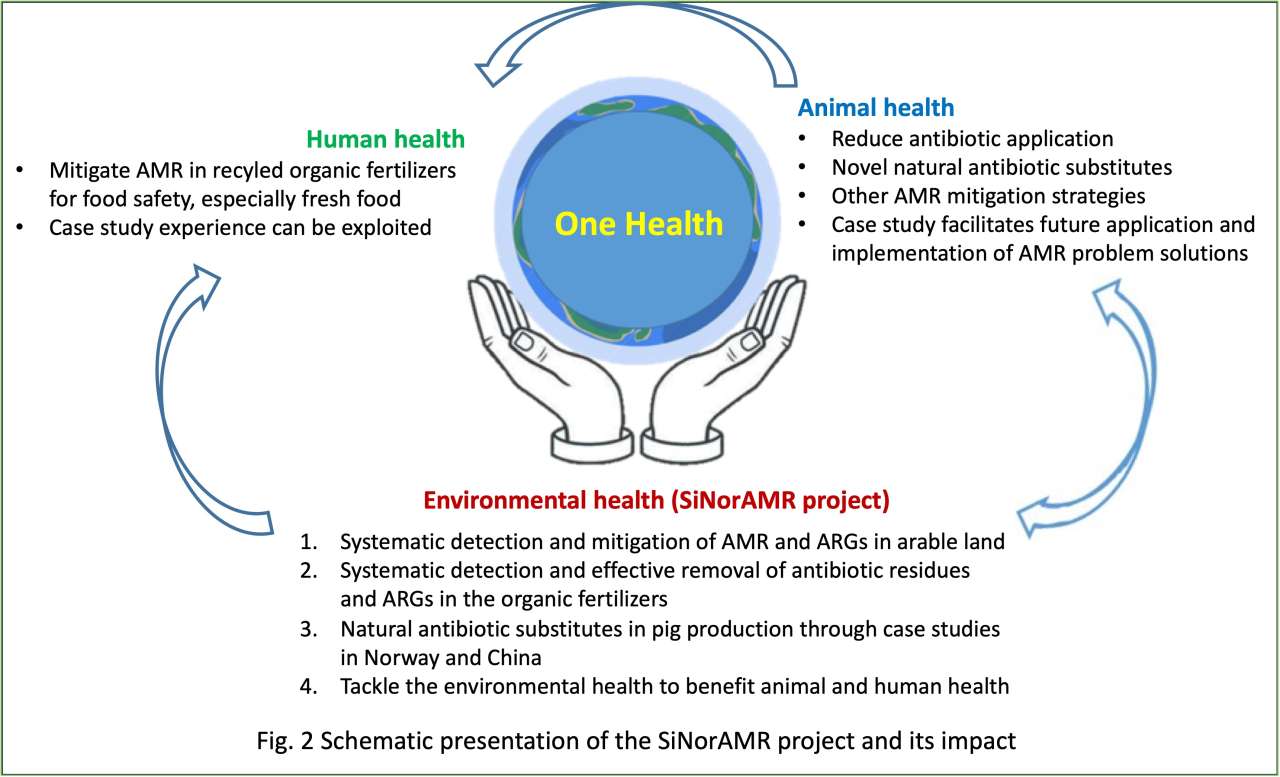Division of Environment and Natural Resources
SiNorAMR

End: dec 2026
Start: aug 2023
Full title: Collaborative and Knowledge-building Project Collaborative Project Systematic detection and mitigation of antimicrobial resistance in soil environment and animal health contributing to human health (SiNorAMR)
Project participants
Hans Geir Eiken Mikkel Meyn Liljegren Anders Aas Eva Farkas Simon Weldon Thiago Inagaki Hege Særvold Steen Inger Heldal Prof. Henning Sørum, NMBU, Norway Senior Researcher Marianne Sunde, Norwegian Veterinary Institute Prof. Fangjie Zhao, Prof. Weiyun Zhu, and Associate Prof Wanying Xie, Nanjing Agricultural University, Nanjing, China Dr Hang Su, China Professor Di Liu, and Dr Ming Tian, Heilongjiang Academy of Agricultural Sciences (HAAS), Harbin, China COO Siv Lena Skar, Columbi Farms AS| Start - end date | 01.08.2023 - 31.12.2026 |
| Project manager | Jihong Liu Clarke |
| Division | Division of Environment and Natural Resources |
| Department | Biogeochemistry and Soil Quality |
| Funding source | The Research Council of Norway (RCN) |
Antibiotics are widely used in animal husbandry because of their functions in promoting growth and preventing diseases, but also cause severe problems to food safety, human health, and the environment globally (www.who.int). The global spread of antimicrobial resistance (AMR) and the antibiotic resistance genes (ARGs) can render the currently available antibiotics ineffective or compromise their efficacy in animal and human medicine.
The risk of AMR is amplified by horizontal gene transfer (HGT) of ARGs among bacterial communities in the environment. Of particular concern is the transfer of AMR from animal production systems to agricultural environment using animal manures or manure-based organic fertilizers.
While applications of manures to soil increase soil organic matter, recycle nutrients and promote plant growth, the practice can increase the reservoir of ARGs in the soil and facilitate their transfer to the food chain (e.g., vegetables and fruits), potentially impacting human and animal health. China ranks on the top in terms of antibiotic consumption and has imposed law enforcement to reduce the AMR problem, while Norway has experience in reducing and eliminating antibiotic usage in animal feed.
The aim of the SiNorAMR project is to establish a systematic detection method of AMR and ARGs in soil environment and animal production, and to mitigate the ARGs in the agricultural ecosystem by controlling of antibiotic resistant bacteria (ARB) during animal production and transfer of ARGs to soil. The project intends to screen ARB in soil environment, animal production (e. g., swine, poultry, and bovine), during treatment of manure, and in crop production using novel detection technologies (e.g., DNA chip, genomic sequencing).
The risks of ARG transfer and HGT within and between different compartments from animal production to soil-crop systems will be analysed for the identification of factors that affect the transfers. The project will also compare the effects of different strategies for animal production, manure management and propose proper countermeasures through case studies in both countries for the mitigation of antibiotic resistance.
The knowledge, methodologies and solutions developed in this project as well as the experience acquired can be shared and implemented in the countries during and post project period.
